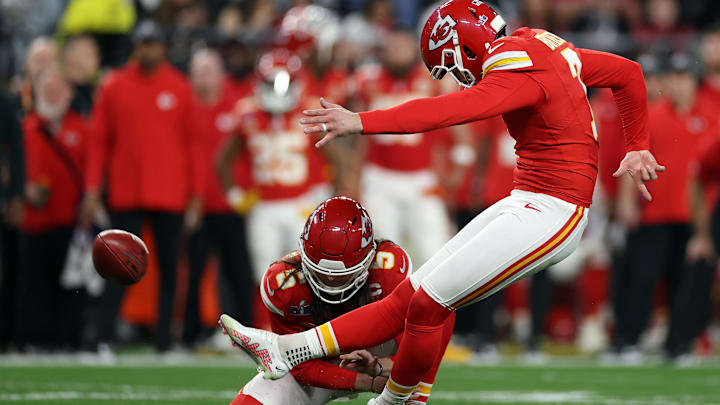Earlier this week, the Kansas City Chiefs reached a new deal with the star kicker, signing him to a four-year, $25.6 million contract extension that will keep him at Arrowhead through the 2028 season. It makes Butker the highest-paid kicker in the league, with his $6.4 million yearly salary the highest in NFL history. As I said, he got paid.
It’s an awful lot to pay a kicker. It’s also a deal that is worth every penny.
Think of it this way. Paying a kicker $6.4 million a year is like buying snow chains and tyres for your car – if you live where it snows in winter, you'll need them and it's a great investment. If you live in the desert, it's a total waste of money.
The Kansas City Chiefs aren't travelling on a highway to mediocrity. They'll be driving up the Super Bowl mountain in February, and they'll need a kicker and snow chains to get to the summit.
Butker is one on the best kickers in NFL history. That’s not an opinion or hyperbole, it’s a fact.
Harrison Butker sets a new Super Bowl record with a 57-yard FG, previously set by Jake Moody earlier this game. 🙌
— NFL (@NFL) February 12, 2024
📺: #SBLVIII on CBS
📱: Stream on #NFLPlus https://t.co/dClcEDViWl pic.twitter.com/lRnIDUEOS5
Since the Chiefs signed him off the Carolina Panthers practice squad in 2017, Butker has the second-highest field goal percentage in league history—89.14—narrowly behind Baltimore Ravens kicker Justin Tucker’s benchmark of 90.18%.
Last season, Butker hit 33 of his 35 field goal attempts and he nailed every single one of his 28 extra points, but it was the playoffs where Butker was most valuable.
In the postseason he was a perfect 11-from-11 and 8-from-8 on field goals and extra points. He drilled the longest-ever field goal in Super Bowl history against the San Francisco 49ers, before slotting home the game-tying kick that sent the game to overtime.
Three teams saw their postseason end in some way off the foot of a kicker last postseason alone. In the Divisional Round, Buffalo’s Tyler Bass missed a game-tying field goal late in the fourth quarter against the Chiefs.
Energy feels sapped out of Bills stadium after kicker Tyler Bass misses a crucial field goal that would have tied the game. Wide right: pic.twitter.com/UWEl1SpPhf
— Cameron Wolfe (@CameronWolfe) January 22, 2024
His attempt from 44 yards sailed wide right, with Butker’s earlier 47-yard field goal the difference in a 27-24 Kansas City victory.
A week later in the NFC Championship game, Anders Carlson had a chance to put the Green Bay Packers up by a touchdown with under seven minutes to go in the last quarter. He missed. San Francisco got the ball back, marched it 63 yards downfield into the end zone, and won.
And in the Super Bowl, 49ers kicker Jake Moody had a fourth-quarter extra point blocked—an outcome that kept the Chiefs within three points. What happened after that? Butker hit not one, but two game-tying field goals of his own, before the Chiefs won the game in overtime.
Looking back further, it is fair to say that the Chiefs might not have any of their three recent Lombardi Trophies without Butker. Beyond his exploits last year, he hit all five extra points and the game-winning field goal against the Eagles in Super Bowl LVII.
THE SUPER BOWL WINNING MOMENT!
— ESPN Australia & NZ (@ESPNAusNZ) February 13, 2023
The Eagles get called for a holding penalty, leading to Harrison Butker kicking a go-ahead field goal for the Chiefs. 🏈🏆#SBLVII pic.twitter.com/AwQj1kiUPE
Butker also kicked the 45-yard game-winner against Cincinnati two weeks prior. Oh, and in the divisional round? He drained two 50-yarders against the Jaguars.
Harrison Butker's 45 yard field goal in those conditions 🥶 to send the Bengals packing, and go back to the Super Bowl is stuff champions are made of! 🔥 pic.twitter.com/miGLmAjemQ
— Brad Henson Productions (@BradHensonPro) April 20, 2023
In 2019, Butker made the most field goals in the NFL during the regular season, and he was 2-for-2 on field goals and 15-of-16 on extra points in the playoffs. And, of course, let’s not forget who it was that kicked the crucial field goal in the great 13-second comeback against the Bills.
To say Butker has been lights out in the playoffs would be an understatement.
Yes, you could argue that Butker’s contract takes up more cap space than you might like. But the fact that the Chiefs let Tommy Townsend walk to sign a new punter on a minimum deal means they have that flexibility.
To put it simply, if the Chiefs want to pull off a Super Bowl three-peat, they are almost certainly going to need quality kicking to get there, and Butker is the perfect person to provide that.
